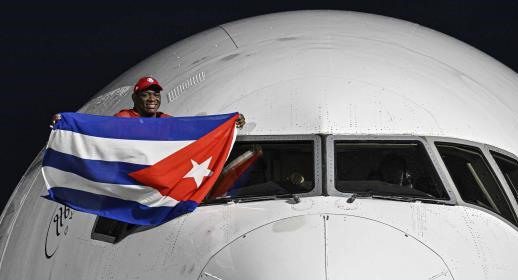BTN News: In a dazzling display of national pride, thousands of Cubans gathered along the iconic Malecón in Havana to celebrate their Olympic champions, who recently returned from the Paris 2024 Games. The event was headlined by the legendary Mijaín López, a five-time Olympic gold medalist in Greco-Roman wrestling, who led the Cuban delegation in a triumphal homecoming. The celebration, marked by music, joy, and a sense of unity, provided a brief respite from the severe economic challenges the country is facing.
The champions’ bus, adorned with national colors, made its way through the streets of Havana, culminating at La Piragua, a popular open square along the Malecón, where thousands eagerly awaited their arrival despite the late hour. Mijaín López, accompanied by his two children and fellow athletes, took to the stage to greet the cheering crowd. “We are thrilled to be here,” López remarked, visibly moved by the overwhelming reception. “The welcome has been incredible since we stepped off the plane.”
Earlier in the evening, the athletes were personally greeted by President Miguel Díaz-Canel at the José Martí International Airport. The president, alongside López’s mother, Leonor Núñez, who embraced her son with pride and emotion, marked the official return of Cuba’s Olympic delegation. The Cuban presidency, via social media, announced the arrival, emphasizing the significance of the athletes’ achievements on the global stage.
Mijaín López, affectionately known as the “Giant of Herradura,” has solidified his place in sports history by becoming the first athlete to win five consecutive Olympic gold medals in the same individual event. Alongside him, boxer Erlislandy Álvarez, who claimed victory in the 63.5 kg weight category, also shone brightly in Paris. Their achievements brought a sense of pride to a nation grappling with significant economic difficulties, including severe inflation, frequent power outages, and shortages of basic necessities.
Cuban state television had been building anticipation for the celebration, airing messages from López inviting his compatriots to join in the festivities at the Malecón. The event, intended as a national celebration of the Olympic medalists, saw its turnout impacted by the ongoing transportation issues in Havana. The scarcity of gasoline and the reported breakdown of half the city’s buses made it difficult for many to attend, particularly late at night.
Nevertheless, those who managed to make it to La Piragua were treated to an electrifying concert featuring three of the country’s most popular salsa orchestras. The music filled the air as the audience danced and celebrated alongside the athletes, who took time to mingle, take photos, and converse with their fellow Cubans. The joyous atmosphere provided a momentary escape from the harsh realities facing the island.
Cuba’s performance in Paris was a mix of triumph and reflection. Despite the athletes’ best efforts, the nation fell short of its goal to finish in the top 20 in the medal standings. With a total haul of nine medals (two gold, one silver, and six bronze), Cuba ranked 32nd overall, its lowest finish since the 1960 Rome Olympics. However, in a regional context, Cuba remained a powerhouse, second only to Brazil in Latin America, which finished 20th with three golds.
The celebration on the Malecón was a testament to the enduring spirit of the Cuban people, who, despite facing one of the worst economic crises in decades, came together to honor their Olympic heroes. The athletes’ achievements, while perhaps not as numerous as in past games, still sparked a sense of national pride and offered a glimmer of hope during challenging times.


